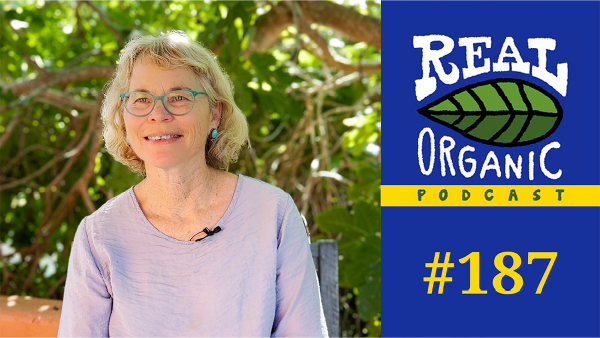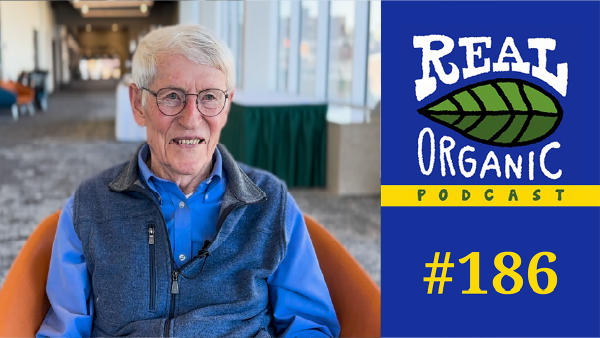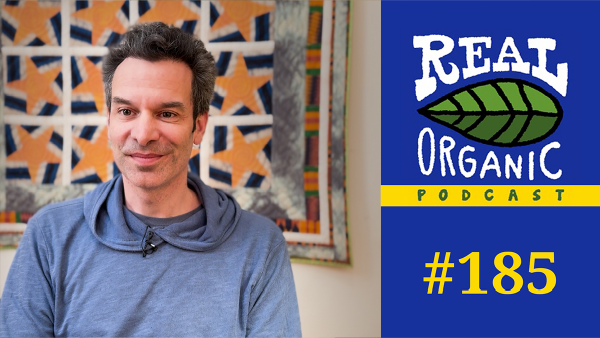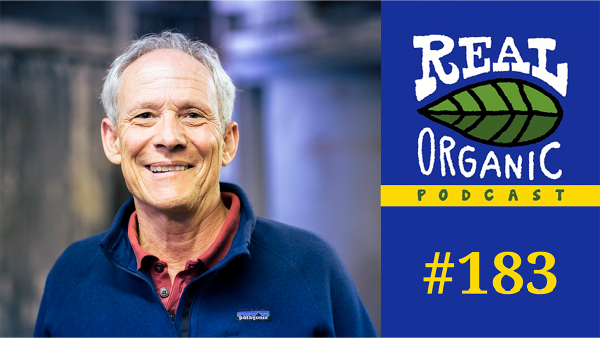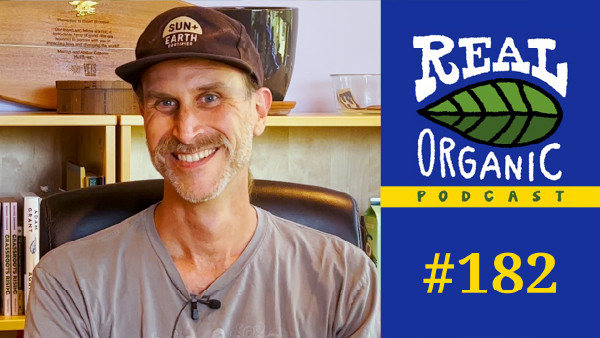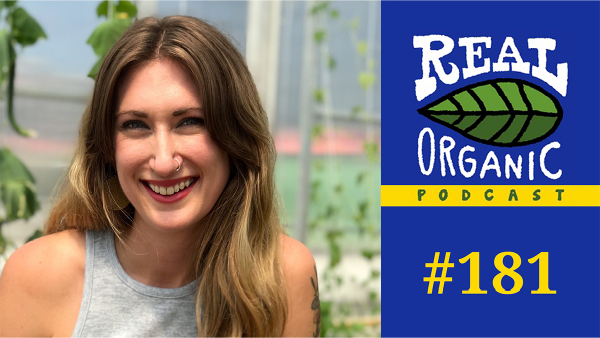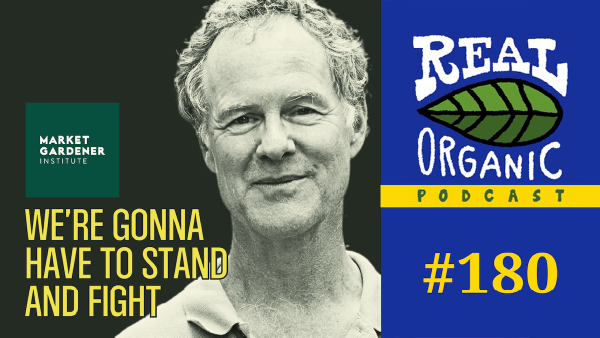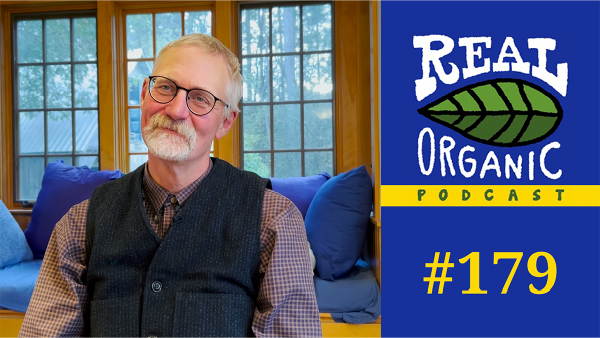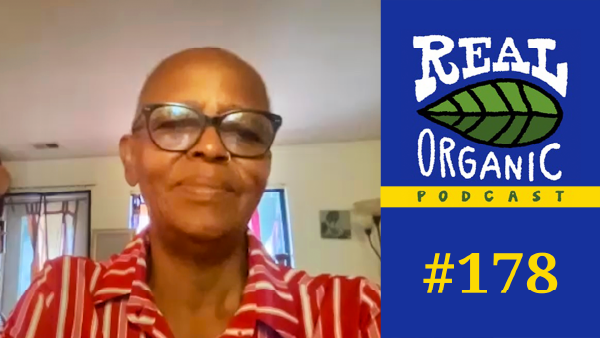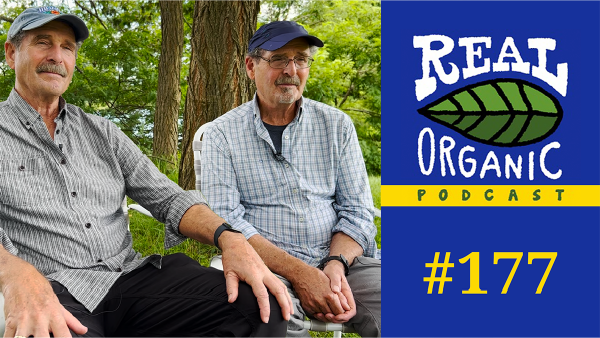Episode #184
Jesse Cool: Inspiring The Next Generation Of Ingredient-Driven Food
Welcome! You can subscribe and download episodes of our show through your favorite podcast app.
You can also subscribe to receive the video version of each episode on our YouTube channel.
Our Jesse Cool interview has been edited and condensed for clarity.
Dave Chapman interviews Jesse Cool, January 2024 :
Dave Chapman 0:00
Welcome to The Real Organic Podcast. I’m talking with Jesse cool the day. Hey, Jesse.
Jesse Cool 0:06
Hi, Dave.
Dave Chapman 0:08
You’ve been such a kind and generous host to me and to the Real Organic Project in the last day, we had such a wonderful gathering at Flea sStreet yesterday, which is your restaurant, cafe, you know, gift gift to the community, tremendous food, tremendously warm place to gather. I would like to talk with you, we’ll get to the real organic project. But I would like to start with well, how did you come to be in the food system as a professional as what you do?
Jesse Cool 0:42
I started in this business as a little girl who dreamed and understood that food brought love. And I live in a small coal mining town in western Pennsylvania where my father on the grocery store and my uncle had the local slaughterhouse and my dad had gardens. So as a little girl, I knew that food, not only gave love, but it brought love. And so I used to play restaurant and play house and started working in my dad’s store at the age of 12. And so I really didn’t think I would be in the food industry. In fact, I wanted to not do that. But what was natural in my soul, and my heart and my passion, no matter when I entered a community was to cook and survive through cooking. And I ended up in the restaurant business in California.
Dave Chapman 1:42
So what was your first restaurant,
Jesse Cool 1:44
the first restaurant was called late for the train because it was by the Menlo Park train station, and probably the least expensive property around. And we call it late for the train because it was by the train tracks, and it was 1976. And we used local organic food, though at that time, we couldn’t even talk about it, we couldn’t put it on the menu. And according to some sources, we were the first or actual organic restaurant in the country.
Dave Chapman 2:16
So you were part of something that was happening. It was happening in farming, but it was also happening in restaurants. That was pretty exciting. It
Jesse Cool 2:26
was beginning to happen. But none of us were really connected about using what what are one of our core values was not called organic, it was called clean food. Because I was taught as a kid, what I still believe in what the restaurant is still about is our old world ethics. And that is that you don’t poison the land and you don’t poison the food and you don’t poison people who are either growing it or eating it. So you just eat real food no matter what it is. And so that’s what we were doing, at least for the training we still do at Fleet Street is we make sure we know where our food comes from. And it’s not tainted with anything but grown in good soil and good water and sunlight.
Dave Chapman 3:15
So it’s nice, you’re connecting this to kind of a personal tradition. But it was also I remember 1976 And it was a time of tremendous change in America, in our culture around many things, but certainly also around food and farming. And I think the whole food system. And music can use it. That’s right. That’s right. Yeah. So we were all carried along by that wave. It’s who knows who was in control of anything? And was it? Was it on some level obvious to you personally, that this is how you would do a restaurant? Or was this? Did this seem like a really daring idea to be sourcing local food that hadn’t been sprayed with pesticides?
Jesse Cool 4:10
In the 70s, I think doing what we did was definitely not mainstream or trendy, and there was very little connection to others. For me, it was I was taught something and if I was going to live my life with ethics, I had no choice. And being a woman I was 27 years old, long hair, hippy long dresses, you know, working with any local people we could find there was no meat then there was Turkey that was distilled Turkey that was grown without hormones. There was very little product even though we lived in the midst of farmland. And so what I suppose drove me was what my parents taught me which was if you’re going to feed people you feed them with For the most integrity, and even when times got very tough and I remember my, my mother was whispering in my ear. Nobody knows you’re using organics that the ions are organic, or the letter says organics. And I looked, I said, but But you taught me something different. And so what I believe, has been one truly sustaining element in my career of now 47 years is that, that it was important to really respect the people who fish and farm and ranch and grow the food as much as possible. And to also do the same with the people who are harvesting and delivering it and preparing it and serving it all the way along. That hasn’t changed. It’s really hard. It was really hard back then. Yeah, especially being a woman cooking organic food was just that was just regular food. It wasn’t crunchy granola, health food. It wasn’t just tofu, and miso and fermented. It was regular food. It was a turkey sandwich. It was a great cheese omelet, but we tried to know where the food came from that had no chemicals in it. That was the bottom line, no chemicals or preservatives, or additives.
Dave Chapman 6:18
And, and your mom’s comment is interesting to me. So it was like, this wasn’t something done in order to win a market. This was something done because you believed in it. And you thought it was better food. I
Jesse Cool 6:33
had to learn how to make money. Yeah, I had no clue what that meant. Because I mean, some people say hippie, I would call us love children, that we lived in communities and, and that’s where I came from. And I never went to cooking school or business school, I finished college and religion and language and ended up doing what was natural in me cooking, which I think a lot of people do, especially women, cook from their hearts at home or try to open businesses to serve the community. So when my mother said that it was she was protecting me, because I was it was one of the many times that was nearly going bankrupt. And she was just trying to say, it’s, it’s okay, if you can’t do it, right. But I didn’t know what else to do. So.
Dave Chapman 7:25
Okay, so you were doing it right? Were you able to convey that to to a clientele who said, Oh, that is the kind of food we want to eat or was it was all of that kind of political biological backdrop and visible and it was just this tastes good.
Jesse Cool 7:43
In the 70s it a few a handful of people really got it. There were people who ate it late for the train, and then Fleet Street, who were very, very much in support of organic, clean food. And you know what else to call it? I mean, there have been so many words now farm to table sustainable, none of those words existed, the only word we had was organic. And I couldn’t put that on the menu, because it would turn people off. And they would make fun of me and call me lunatic fringe. That
Dave Chapman 8:17
true for me to learn. I would I would go to farmers market in probably 1976 Something in those early early days. And you couldn’t I finally stopped calling it organic because I was tired of arguing with people. And it was not considered a big a big draw in the marketplace. So we we were proud of what we did. We were proud that it was organic. But back then I had a table with a little ham written sign. And I just said, Well, I’m tired. Are you going for today? So I’m retaking down the organic side?
Jesse Cool 8:55
Yeah, I was pretty adamant. I was. I was not willing to not talk about it. I mean, I was told to get off my soapbox many times, and making other people feel badly because they were not what I thought, being respectful. And we weren’t always perfect at fixing myself when you know if a box of strawberries came in, and they were not organic, and they were from Green labor, I would think Oh, what am I going to do for today? Use it. But make sure tomorrow you get what you need. It was not a perfect world, especially back then. But I knew we were always trying. Yeah. Today it’s a pretty perfect world. It’s like dreamy, we can get almost anything we want now but back then it was hard. I think that the word organic had to be a little bit quieter. Because what you mentioned earlier to get people into a restaurant the food has to be delicious. Yeah. Has to be delicious. It has to be beautiful and our food was never overly done. There was never anything on the plate that was not edible. It spoke for itself. I remember decades into it when my children were finally old enough and asked the question, what kind of a restaurant does your mom have? And I could never answer, because we were California, but we weren’t really California we were. We were organic. We were a Jonah finally said, Mom, your ingredient driven, period. Everything you do is driven by where the ingredient comes from, how it’s grown. how it tastes. If the plate looks beautiful, is because the ingredient was beautiful. But it could be a plate of mashed potatoes with a few chives on it, that people are raving over and they say, wow, how did you do this? And you always lean over and say, Oh, it’s really about the potato in the butter. And I still have to charge you. But that’s what it’s really about.
Dave Chapman 10:52
Yeah. So you watched that grow into a movement, what you were just doing? Yes, started to be something that other people started to do. And more and more, and people talked about, and there became a lot of idealism associated with it. So what was that like? Well,
Jesse Cool 11:14
I wasn’t alone. Then there were people like Odessa, Piper, Nora poo Yan, Alice Waters, so we’re, Oh God, I don’t want to miss anybody. But Joyce Goldstein, there were many people who were a part of it back then. But we were so disconnected. An organization called chef’s collaborative back then, and always brought many of us together. So we begin talking to each other. But what it felt like was lonely. I used to say I felt like I was in Palo Alto, Menlo Park, Palo Alto. But I lived in the middle of Idaho, because it was so isolating, and I couldn’t get the food I wanted except I started knowing local people. So I would say it was lonely and isolating and scary, and minimal support. But I didn’t know what else to do again. I just didn’t know how else to do it.
Dave Chapman 12:10
That’s so important. Jesse. I, I just, I see that that community that connection, that net ROI is so important. Yes. Right. And that, yeah, people can do it alone and isolated, and, and scared. And you know, some people are very strong. And they keep going, you kept going, but gosh, it’s it’s a it’s an awful high price to pay. And if we can do exactly what has happened, then it becomes something that is widely available. Well,
Jesse Cool 12:47
I think along with my children were happy, I’m still alive to witness this because like an artist, you may not get to experience something you believe in or something that your art because food is art to, or that your passion until many years later. So and we didn’t make much money, it was really hard on my kids to be like this. And they, you know, some people thought it was cool that a lot of people mock them. But looking back it, I’m very grateful that that we held on and the community has been so good. This community has been so supportive and kind through all the ups and downs, specially through the pandemic to make sure that that we survived and the farm survived. We did something called meals of gratitude in the pandemic and and very quickly, someone from the hospital approached me Stanford Hospital and we sent 29,000 meals to frontline workers, but they were organic. They weren’t like pizza or burrito. We had these little lunches that we put in heart stickers and our own biscuits and homemade organic soup and reached out to the farms and didn’t ask them for any break price. Just set up a nonprofit so we could send this healthy food to the hospital. But it was also a good business app. Because we employed people we were supporting local farms, it just the people who were working, were happy and felt a sense of place. So it’s always rolled into some magical moments by being connected to those beginning values that my parents taught me. And every time something might have been disruptive or difficult. The community always shows up. Because we’re connected. And I love them and they love me. That’s what I would. That’s what I’d actually say. I’m so
Dave Chapman 14:41
grateful. Yeah. So there’s a true resilience there. i I told you I wanted to ask you. I mean, I know this is a really obvious question, but it’s important question the difference between Fleet Street and McDonald’s and because there are so many McDonald’s, and they are a major world power, because many, many people go and give them their money. So could you talk just your thoughts? Because I’m, I’m really trying to think about the food system these days? Yes, of course, I started with the farmers. But the farmers don’t farm in a vacuum, they farm and that food somehow finds its way into people’s kitchens, or into their mouths if they’re eating in a restaurant, or it doesn’t. And it rots in the field and the farm goes out of business. So as somebody who’s been working on a particular restaurant for many years, and you look at McDonald’s, what do you think? I mean? Why should people support flea street?
Jesse Cool 15:54
So first, I want to go back to something you asked I didn’t answer. And it was how, how did how does it feel to be here now, with the change? And I remember somebody coming into the bar and say, Jesse, how do you feel having gone through this with not following trends, but suddenly, you’re a part of the trend? And my answer was, oh, along with the farmers, we were right. And so my answer to the question about the difference between McDonald’s or a chain restaurant, there are some really good multiple food service operations is, if each of us does what we do, I think there’s a place in community, my values in it, and I think I’ve opened seven restaurants has always been to just be very connected and stay small enough that I can be be the way I think we should be to people who are harmed are growing and fishing and ranching, harvesting our food or cooking our food and serving our food that we are doing the best we can to take care of them. So the answer might not be what you think it’s going to be. But for me, the growth meant I couldn’t control it. Though I might have offered better benefits, but I couldn’t control the quality of the food or where it came from, or how the people were treated. I know that the implications of what it means to go big and buy food in that quantity means something that I don’t believe in my kids couldn’t eat in McDonald’s as kids, they would sneak of course. But because the values of what of what was going on and how they source the food and the misunderstanding of the Western world, to that terrible, terrible misnomer of big and cheapest value, and good. That was the hardest thing for me, it’s still still hard for me to drive by a billboard that says to sandwiches for $1.50. My response to that is who’s not getting paid? Oh, my goodness. Where in the food chain is somebody not getting taken care of. So though I know they exist in the in the world? My my lifetime is to do what I do. And that is really respect food and the environment and find happiness that way.
Dave Chapman 18:34
Yeah. No, I I completely understand your personal choice. The thing that’s interesting to me, I’m not ready to give McDonald’s quite the pass. You are maybe
Jesse Cool 18:47
No, I’m not giving them pass. I’m trying like there are many restaurants that are different than mine. Yes. If I was getting down dirty and not on camera, I might talk to you off the camera about some things I believe. But I think I think our jobs and teaching the future is that they don’t be negative, but they find ways to create new positives. And if I can keep sharing that what I do in my life brings me so much personal enjoyment, even though it’s really hard and I had to, you know, go through some things that were my own personal growth and say I’m sorry to many people because I wasn’t perfect in my life that they can, even though there are these other ways of having a restaurant, they have the choice to do whatever they want, and I’m not going to judge them. Yeah, I may not support them. Yeah, I may not spend my money there. I’m gonna keep probably supporting and spending my money and telling great stories about the people who I think are deeply connected to to one of the most important parts of our lives, which is food. Yeah, yeah, sitting in a table. Well, does that make sense? It does
Dave Chapman 20:11
Seth Godin once said to me, you know, Dave, you’re not going to take down Cargill. And I was like, yeah, yeah, you’re right. We’re not going to take time, we’re not going to take down McDonald’s. But I actually believe that. You know, it’s killing us.
Jesse Cool 20:28
So I’ve another part of my life you might not know about is I’m a consultant at with health care. And I consulted with Sodexo, and Stanford Hospital and queens Hospital in Hawaii health care services. And walking into those places, they hired me to try to help them fix it was just shocking. It was really something to be in the kitchens of places where they were feeding people who were not well, and realizing that a lot of what they were serving was why they were up in those beds, but they want to change. So what I had to do was not be a hoity toity chef, and go in there and say we’re going to do it this way, I had to figure out how to make small changes over time to see if it would have an impact, and make sure that they didn’t hate me. Or think I was pushing something on them. Because I come from this little organic restaurant up in the hill. And it worked. Stanford hospitals, food is amazing. I give them credit for making huge changes. I was a part of the beginning. So I think walking into situations where someone’s very different than you. And being able to have a fair conversation with them and say what you think, even if you don’t change them, maybe there’s someone on the other side of me that’s going to think differently. I remember sitting with an old ways conference next to the think was vice president of Pepsi or something. And people said, seriously? And I said, Yes, I am the right person to sit next to him. That’s how it should be. We need to talk to each other. I didn’t change Pepsi.
Dave Chapman 22:16
Yeah, I agree. We need to talk but Right. We’re not we’re not gonna change Pepsi, I don’t imagine no,
Jesse Cool 22:23
but I think you and I were talking earlier about my happiness in my business. Because I was very burned out, I would have given it given I had one at Stanford to I was just so tired of pushing something that had become so hard. And the pandemic had many silver linings, though it’s not been easy, there are places to deposit. And it is some of the old guard that thought a certain way, don’t fit into some new models, and that they’re beautiful, amazing, very young people who want to learn something different. Maybe it’s true in farming to the young, I’ve noticed the Eco farm and we talked about how young people are starting to show up. And we thought for a while, I remember with being with will and will and I put our arms around each other. It’s like, it’s a bunch of old people here, what are we going to do. And then the next year, the more young kids showed up, same thing in my restaurant. Now they’re all young, and people comment on how young they are. But they almost read us, they also read us really highly, because they’re not doing fine dining, but they’re really performing thoughtful dining, and respectful. And so I have incredible hope for the future because of the next generation. So rather than just talk about what’s done, and the demise, which is a lot of the conversation, that’s what the news is filled with. I’m really wanting to have a big voice in what is done in this little restaurant. And I think it’s possible in multiple restaurants, just like multiple other kinds of businesses, that if you run the business with respect and integrity and thoughtfulness and kindness and treat people right, even in the food industry that we can make change.
Dave Chapman 24:15
Okay, let’s talk about that. Because I know that’s very dear to your heart. So happy to get let’s get happy. I’m a downer. So let’s get happy. Let’s talk about just because it’s important. The Molly that you’re creating and Fleet Street, you have a young team, right? It’s led by you and a young chef. Yes. How old is Brian?
Jesse Cool 24:40
Brian is now 25 But he started just after his 21st Birthday six months before the pandemic start.
Dave Chapman 24:48
Yeah, yeah. And he’s he’s grown tremendously me as a wonderful person but his food is tremendous. But But more than good food When I go there, and I, I, it feels good. I know a good place. I know a place, it feels good. The people in it are not. They don’t act like prisoners. They act like excited that this is their thing, and they’re doing a great job. So it seems like it’s a pleasure to serve you. Congratulations,
Jesse Cool 25:24
thank you. And they, they really like hard work. And those who because we did I interrupt, you know, because we started something different. During the pandemic. I mean, the only people working were the kitchen. They were in the past. They were the lowest paid people in the restaurant, they were the least respected, they were back of the house. And during the pandemic, I talked to all kinds of other restaurant people on zooms. One of the most prominent was Danny Meyer, we all talked about how broken we were, before the pandemic, what were we going to do when we opened. So flee streets started something called Heart of the house, we do not use back of the house, and we’d not use from the house any longer. We use service and production services, the old Front of House Productions, the kitchen, and they’re all heard of the house, and everybody gets charged a 20% service charge and is divided from the dishwasher, to the bartender. According the number of hours they work, you work harder, you make more money, not the way it used to be if you were server you came in, and you no matter how many hours you took all the money. Not that I’m bashing the service team. But everybody’s needed a clean bathroom is important than a restaurant clean dishes are. That’s the most important position. So we started a new model. And it was really hard when we opened again after being closed because nobody wanted to work with me, I had not a good reputation in the community for not paying the servers what they used to make, or they thought I wasn’t really respecting them. I said, No, no, no, I respect you. But I respect you as much as the cooks. You both make this happen for the guests. Remember, our core values are the customer comes last, we’re able to rewind when I opened the restaurants. And we took care of the staff and the staff, we know we took care of where the food came from all the way from the beginning to feeding people on our staff well to then you’ll get taken care of recall and back to that. And we had a hard time hiring people for service, we didn’t lose one person who kitchen. And there, we still have the same crew in the kitchen. We have no trouble in the kitchen, because they’re paid. They’re compensated and treated well and respected. So that makes me very, very happy. So the reason there’s a young crew is because we have these young kids, young people in the front, who really wanted to learn something different. We found a young man at a hardware store and I said, Would you like to do something different? We’ll train you. We found a young woman at a farmers market. Would you like to do something different? We’ll train you? Yes, you’d have to work hard. You want to learn we found somebody else at a I think it was like a they were a barista they could never imagine being a service in a thoughtful dining restaurant. We trained him. And Brian, Brian, Chef, general manager who is now running that place, put his arms around it and many times has said, Jesse, we’re so positive about the food industry. If more people talked about this, I bet there are other people doing similar things. If more of us talked about that, and we’re really brave enough to change it. Restaurants with thrive again, we will be paying small farmers again, we would be rebuilding something. Yes. Is that the answer? You were?
Dave Chapman 28:41
That’s that’s a wonderful answer. No, that’s a wonderful answer. You know, when you say the customer comes last, it reminds me of the old phrase to describe organic farming, which is feed the soil, not the plant. And it’s not that you don’t want the plant to get fed. You know, no, no plant and you’re out of business. But the way to feed the plant, the best way, the best way, the most economical way is to feed the soil. And you’re saying yeah, and the same is true here. If we if we feed the suppliers, and if we feed the the whole staff, then the customer is going to have an awesome experience.
Jesse Cool 29:26
It works is what’s interesting, you start out by saying you could feel it and people can sense it, feel it. And it’s not right for everyone. Some people just want to go in and make a lot of money. Then there are plenty of places for them to be but if they want to have a place where they are working where they’re, they feel like they’re nourished and nurtured and they’re asked to do the same to the people they’re taking care of. Or they get to meet the vendors. You know, they excuse me, they know who Paul is and they go the farmers market a lot of chefs So the farmers markets were really engaged in and have that back and forth, or have the history we have over 40 years with some of these people is a rich life, it’s back to what we started talking about. I was brought up that way. I was brought up knowing those people. And I think that’s the future. I think the young are going to get tired of this disconnect, get tired of being alone, debt, get tired of eating, forgive me sh#*y not real food, and find that they are not very well, because of that. It’s already happening. But the hope and dream of us as elders, is that we stay positive about it. And you and I were talking earlier, we listened to their music, so we hear what they’re saying, in their poetry and in their lyrics. And we don’t we don’t react with no, no, no, that’s the way it used to be it Oh, my goodness, look how bad it is. Now. we surround ourselves with them, which is what fleet Street’s about. I’m listening to music sometimes that I want to turn off and say, Could you just put on jazz plays? And they’re there? No, no, we want a little bit of aliveness. It’s like, okay, I have another drink. I can do this. Well, how about have we all danced? And they said, Yes. Why don’t you just dance them? To be open to that as matriarch or an elder or somebody at this time in my life makes me feel revitalized. And I had to surrender. Again, we talked about this, I had to surrender to letting go of just my ways, and testing new ways, because that’s what people did with me when I was young. Let let me test things and they let me fail, pick myself back up and figure out how to do it better. And so I’m so delighted to be with Bryan, who teaches me and I know that I’ve instilled values in him because he really, you felt in last night, you really, really is very excited about having a true connectedness to food that he cooks and people. Yeah. And his staff. He’s so genuine. You
Dave Chapman 32:17
describe going to a staff meeting like so yesterday, you had a gathering of people who are supporters or just curious about the real organic project, you know, at the restaurant, and it was really fun. It was really interesting. You got up and talked and Paul Mahler from full belly. And Lindley and I and it was it was great. And everybody, everybody who was in the crowd was talking and it was a conversation. It was a
Jesse Cool 32:45
salon. It was a salon.
Dave Chapman 32:47
So after, after you said you went to a meeting of the team? And tell me about that. What I’m curious about their reaction to what was happening. Were they curious, were they excited? Were they just interested?
Jesse Cool 33:04
So every night Brian brings the staff together, it’s the nightly meeting, when they talk about who’s coming in any new food on the menu or where something came from or our moods. Boosh comes from a local farm or a garden last night was full belly grapes. And we just give that as a gift from the kitchen. And then I said I was quiet for a while. And I first thank Brian for the beautiful food he fed all of you and how excited and happy I was that he was leaving the restaurant with some values that have always been there. And there are a couple of other people in the group one comes from a local farm and she is now our fabulous hostess. And she knew that we were talking to that we were entertaining and beginning to become a little more political about food because Brian’s ready and have you there the real organic project and to talk about issues. And I what I took away from them was they were very proud to you to be a part of this, to have something meaningful happening at their place of work. And to know that it was really authentic because they know where all the food comes from. We’re very transparent. I mean, even our wines, we know how the grapes are produced and they’re all mostly from the Santa Cruz Mountains or local growing regions in California. So I felt a sense of connectedness for them. And I asked one of the assistant weights who was clearing last night, Alonso if he heard anything in the city, I heard a little bit it was exciting. So pride, connectedness, trust, good leadership with Brian. The elders still there, saying we’re still doing this event. Anything we want more, we would like you all to start telling a different story Brian talked about, this is the story we tell at the table. It is about people from beginning to end, not only how delicious the food is, but that’s what we’re doing out there building more stories.
Dave Chapman 35:19
Yeah. Yeah. You know, they have a thing in Denmark that they do they, every every restaurant has a rating of what percentage of the food that they prepare is organic. And they post it. Oh, we already so well. They’re 20%. We’re at 15%. We’re at 50%. And people look for that. Ah, isn’t that wonderful? Yeah, that’s and the public, the public. Things like hospitals, like universities, they all have this. And they all practice it. And they care about it. And one of the things that they’ve done to make that work, and they’re very smart, is they send the people who prepare the food out to the out to the farms, and say this is, this is where bacon comes from. This is where tomatoes come from. And this is how we do it. And it’s different. And why do we do it this way. And it’s been very successful, they become some of the greatest champions of organic and the food system is is the chefs and the sous chefs. And, you know, and these are not necessarily from fancy restaurants, these might be from very much, you know, kind of frontline working class type restaurants. So everybody can be part of this,
Jesse Cool 36:47
I think it’s important we try, it’s a very just like farming, it’s really hard to get them out of the kitchen. And one of the not silver linings of the pandemic is a lot of people didn’t want to come back to work in service, because they realized they had a dysfunctional lifestyle, working at night working holidays, it’s up, we have now adjusted that we’re not open on holidays, and we close earlier, but it can be hard in our industry to to quit to get them out of the kitchen, we do as much as we can. We also have people of color and different ethnic beginning beginnings in, in our kitchens. And as I mentioned, with heart of the House, everybody gets paid the same, everybody’s treated the same. But they also have a different attachment to their ability to make money, some of them work a couple of jobs. So it can be hard for us to get them all out of the kitchen. So we go the farmers market, we love it when people like Paul, Andrew come in for dinner, and we take them all in the kitchen into distance. So they can have some connection because they they do get it. But I think I think that’s always something we strive for is how to keep us in touch with a real true value system. Yeah.
Dave Chapman 38:08
It’s hard to make space in a business that is very competitive and not not high margins, right? Restaurants are not a get rich quick scheme in general, is
Jesse Cool 38:25
that like, if you have a bunch of them? Are you using, you know, food that the food cost is not very good, or you’re not willing to charge people enough so that you do pay people, because I feel very proud of what we do. And what we charge because we know that even though we may have a bottom line of about 5%, where we’re paying people and that’s the new narrative now to when we go to the table, it’s not where the chicken comes from the we do talk about that. So what we all talk about more is how not only do we try to take care of the people who provide us with really good ingredient, but we also try to take care of the people who were working there.
Dave Chapman 39:06
Yeah, fabulous. Yeah.
Jesse Cool 39:09
And that’s and that’s the message when I say I’d love to have I would love to talk about this anytime as we need more positive in our industry. We’re hearing so much about, about the demise and some of the terrible ways people within the industry have treated each other that to create something that is not like that is what is the more important story to tell.
Dave Chapman 39:37
We’re all one of the things that just occurs to me I agree with you. And you know, we need to be able to tell true stories about about our successes and ourselves, you know, things that we can genuinely celebrate. The bigger the system, not the bigger the system, the greater the concentration have control of the system, the harder that becomes. I see it just we sell to supermarkets, mostly we sell to restaurants, we sell a lot to supermarkets. And when I see a chain get bought out by another chain, I know that soon, the people that I could talk to will be gone. And there will be somebody far far away that I really can’t talk to, and they will make decisions. And they’re so far from the end customer. They think they know but but there’s no ability to communicate the reality of something that a farm can offer than an industrial farm can’t offer or doesn’t offer.
Jesse Cool 40:41
So that scenario makes me sad, because it is true. And it’s something I just would not do in my life. Back to during the pandemic, the shutdown farms did really well, from what I understand. Yeah. It was like, it’s a one time farmers could say we did well. And I remember hearing them say if only I’d known I would have planted more. But it’s because people got connected again. And they loved it, they were able to get, you know, CSAs dropped to their doorstep, they started eating differently. Foods, maybe they never did before because it was in their box. They were connected more. And I wish that we there are some things we miss about that closed down quite honestly. And well. That was one of them. Local farms are doing great all over the country. And I’m not sure what’s happening if everybody’s going back to just convenience or let me get the cheapest or because they weren’t thinking that way. And it wasn’t elitist. People who were of low income who were also unlocked down, we’re getting food from farms, because that’s what we could get something was different that I don’t really know how to talk about because I don’t know if studies have been done about that. But what you’re mentioning, which is back to more, this decentralized way of doing business, did bring healthier, more delicious, more community minded product to the hands of people. And it stimulated production. The people who were doing that there were all these cottage industries popping up. Because there were there were so many cool little businesses that were popping up all over the place outside are dropping food out of windows where they were cooking muffins everyday, whatever it was. It was terrible that during that, but it was awesome. To see how inspiring it was. Something I was thinking about when you were talking about restaurants is I live I’m in California and all my restaurants have been here. But again, in describing the restaurant, and when Europeans come in, I realize Felicia is more European restaurant than a California Restaurant. Because of the style of being if she has, I’m going to say she has because those of us who have read braiding sweetgrass know that we use the pronoun rather than calling it is so fleece she is she has survived because of, of I think, people, and I think there could be more fleece treats. You asked me about this, I don’t want to run on because I’m too old. But I bet Brian would think about doing it. But I think he would make sure that there was somebody in each place that was very connected to him, and made sure those values were upheld. The One Minute Manager book taught me a lot. And it is you can I can only manage five people. Those five people can only manage by people. But I have to make sure that those five people are very touched with me and that those people touch them same. So I wonder if that’s an answer. Well, that’s
Dave Chapman 44:00
part of an answer.
Jesse Cool 44:01
We all get down to money. I mean, every every time we all talk, even at the original eco farms. When we got down to what was really wrong, it was if you just work for money, if you just work for bottom line, or if you only had to pay back investors. It was gonna be really hard in the food industry, no matter who you were. Yeah. Am I right? Is it?
Dave Chapman 44:27
Yeah, well, bad things happen. Because you’ve left out everything that actually matters. Pay the people. That’s right. So so I think one of the reasons that everybody started buying local organic food in in COVID is because they actually were very concerned for their health. In the short, immediate run. They wanted to eat good food, somewhere inside their heart and soul. They know that that is part of how you’re healthy. It’s not to say well, that means you won’t Get COVID. But it means that you will be healthier, your immune system will be better. And everybody was going like I need to do everything I can. I think that was genuine. It was. People know that. Most people know that what you eat has tremendous impact on your health. But they, it’s easy to put that aside. And there’s a whole industry filled with engineers who are working to make you be delighted and crave the food that isn’t healthy. It’s not good for you, but it tastes like
Jesse Cool 45:35
their products for vegans and vegetarians that I want to say, Wait, that’s not real food. Like, no, that’s not real food, why would you not eat a real egg that came from chicken. But that’s another that’s another topic. I think you’re raising was about health. But I also think it brought a different awareness to, to small and to what you what you believe in, and it connected all of them. Because they all were talking to each other again, there was plenty of business for everybody. And I don’t know how we can keep bringing that back. I’m, I miss it. I’m saddened, I loved it, it was great to have the general public understand the value of, of healthy, delicious food, they were starting to talk about soil and composting. And it’s like, wow, this is just so cool. And then we opened up again, and it kind of feels like it’s getting a little diluted again. Well,
Dave Chapman 46:37
you know, we need to find ways that don’t involve that rending of the fabric of our lives in order to, to honor and and support what is actually important to us. So I heard that at at frogs leap. Ted Hall got up and he was talking about organic, as, in his opinion, producing the highest possible value for the lowest possible cost. And I thought, Well, geez, organic isn’t the lowest possible cost, McDonald’s is the lowest possible cost. But I talked to him afterwards. And of course, he was talking about big picture, the big the genuine costs, right? If you’re get sick, it’s going to cost you a lot of money. He was talking about money, but he wasn’t talking about money at the cash register, he was talking about all the other places, you’re going to have to spend money.
Jesse Cool 47:34
Let’s go back to the young again. And let’s remember that we if you read a history book, you don’t read about 10 years, you don’t read about 50 years, you rarely read about 100 years, except maybe the current political situation we’re in right now that one might, that one might pop up. But we’re in a small period of history and time, the next generation, maybe within the next 10 to 15 years, and we have to hope that everything will survive when they will catch it when they can, are going to realize that they’re, they’re getting sick, or that something’s not right. And often things flip. So I would hope that what would happen from the industrialization of something that has been done in a way that’s not as life supportive as we want it to be, will be cut by this the next generations like like people like Brian, or people on my staff who are just so happy that they’re even fed that way a family meal. I mean, if we buy hotdogs, and we do we buy them from cream CO and they’re the most delicious grass fed hotdogs you’ve ever seen in your life. And they realize, Wow, this is this can be a hot dog. So shifting the the minds of the future. And, and like Gandhi would say, one or one person at a time, like you did last night with 17 people. You talk to 17 people and those 17 people then ate the food from full belly farms and tasted it and realize, Oh, yes, this is this makes me feel great. And I’m gonna go out and talk about it more maybe I’m going to invest in this. Maybe they’ll talk to their children who may not listen yet. But as they grow older and it impacts their lives more will realize they’re the change makers.
Dave Chapman 49:31
Yeah. One last thing. That’s great. We were talking about wheat this morning. And bread. Yes. Could you talk about a little his, you know, I’ll let you tee it up just just while teared up a little bit. So I don’t like most of the bread. I don’t like any of the bread I can get in Whole Foods. I just don’t think it’s good bread. And I mostly baked my own bread, which is much, much better, although not as good as Dan Barber spread, which is why I want to interview him about that and go, What are you doing here, man? How does this taste sweet? It’s, it’s just holy. Okay, so so go ahead.
Jesse Cool 50:19
Well, it’s ingredient again. And having access to that ingredient makes a big difference. And again, back to the last 75 years in this country when you know, they started mono, growing foods and doing them in ways that was not about flavor, but was about commodity selling of a product. Some people are doing it differently, like heroes like our friend, Dan Barber. And though he’s out on an edge, talking about something, what you experience a lot of people are in San Francisco to they are tasting the pastries and going to small bakeries and buying bagels and going to the market and getting full belly farms green. We’ve been using a company called giusto from the very beginning. And so our flowers good. We don’t bake our own bread, but we buy from a company called as needed. And she sources her grains in the bread. Somebody turned around to me it’s really sweet last night and said, your breads are so delicious. And we make our own biscuits. And they’re made with all organic sourced ingredients. And they taste different. It’s just not into the taste different but probably all these allergies that are did not exist. Whenever I opened the restaurant, there were two options vegetarian and non vegetarian. That was it. There weren’t the many, many things that we have to, to deal with and people’s health now. So I think back to the bread and the wheat, it’s kind of the same simple answer of it’s ingredient driven.
Dave Chapman 52:02
So my question that I’m going to ask Dan, but I’ll ask you is, if I’m an entrepreneur, and I go, it’s not it’s not subtle, the bread is spectacularly delicious. And it creates a craving that, you know, I want to have another piece. I told you, maybe when I went to stone barns last time, my wife yelled out the door, don’t forget to bring back some bread, right? Because we can’t get such bread. And so I’m just curious why somebody is going? Well, I’d like to do this, I’d like to supply all the whole foods in America with the best bread and and it’s going to be a great deal for everybody. So why isn’t that happening? Back
Jesse Cool 52:46
to cost is really hard for us in the food industry. And I know you’ve looked at the many complications in a grocery store, including buying shelf space. Oh my goodness, the cost of delay, there’s so much to producing a product different than Dan Barber baking bread at his restaurant, or me baking my own biscuits and being able to pull some good ingredient or buying from the local great bakery. It’s difference when different when you start scaling up. One of the things we’re challenged with in the restaurant now as everybody used to give bread away. And our breads are biscuits, because we use organic butter, organic buttermilk, organic everything, the cost of all of that. And the woman who bakes bread we raised her prices has been a challenge for us. We used to give away oh my god, people used to leave with like you’re white in their purse, lots of biscuits and bread. We had to stop it, because we couldn’t do it. You know, we give the first away. And then we have to charge for the second round. It killed me. It’s like, oh, but part of what might be another answer to that would be the same thing if people have to pay for it. If that bread was in Whole Foods, it would probably be so much more expensive. That maybe they would be able to sell or maybe not. It’s a it’s a risk for bigger enterprises.
Dave Chapman 54:13
Yeah. Yes,
Jesse Cool 54:16
the cost is the real cost of foods, the real cost. It’s so real. I mean, this is what all our seminars should be. What is the real cost of food and you bring in everybody from the delivery driver, to the fishermen, to the farmer to who’s providing the fuel to who the people harvesting and how much do you pay them and who’s chopping that food and how do we get the the oil that’s the healthy to cook it in? And then how do we make sure the people who are serving it are also taking care of me it’s just what is the true cost of food? The western world is lost. I’m a more European style person or old world, not European Old World. And founded on those principles that many of us remember or when we go there, we love it. Portions are smaller, simple food. The food comes from the local person, you get to meet the person, then we come back here and we eat at McDonald’s. What are we eat it? They eat it places that are not like that. I want to say why? Why are you doing that here on your own soil? Why are you doing that here? It’s not healthy. But the younger gotta change it. Dave. Come on. Where are the elders? Now we have to pass these messages and embrace them. And really, really honor these next generations, like Brian or our children, my children, for spending their dollar in the right way. And really respecting food from beginning to end. The true cost of food, it’s up to us to hopefully close and let them know that it’s the right thing to do.
Dave Chapman 56:09
Okay. Jesse, cool. Thank you so much. This has been great talking to you.


